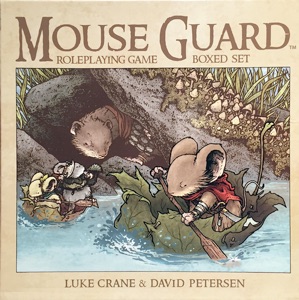Mouse Guard 2E (2015)

We just finished a short, 4-session, Mouse Guard RPG campaign so here are my thoughts.
Mouse Guard is a dice pool system where you roll # of dice equal to your skill or attribute (1-5) with added/subtracted dice based on modifiers (e.g. each person helping with an appropriate skill is +1 die, being tired is -1 die). Each die is 1-3 = fail, 4-5 = sword success, 6 = axe success (which allows bonus die if you spend some resource). In general you try to get a number of successes for a static test or beat the successes of an opposed roll.
You have three role-playing attributes. Goal is the goal for this session and often relates to the mission or a personal project. Belief is what you believe in and is mostly used by the GM as a cue of what to challenge you with. Instinct is what you do reflexively in times of stress. In general these attributes are only used for end-of-session rewards.
The last major thing is natures and you start with one to three. I had Young as one. Natures go from level 1 to 3 and can be tapped to give you a bonus die. Natures can also be activated to fail a tied test, this gives you two checks during the player turn (more on this later).
A session is split into two parts. First is the GM's turn. He presents situations. PCs react to them. GM presents more situations. It is not necessary to resolve everything during the GM's turn, though often the main mission will be resolved.
After the GM's turn is the Player's turn. Each PC gets one Action, plus 2 actions for each Nature activated to lose tests. An Action is anything the PC wants to initiate. Could be a pet project (e.g. building a mill), a subplot that the PC wants to continue (e.g. spying on a personal enemy), or just to have fun (e.g. throwing a party). The goal of Actions are to give the PCs a change to make a skill roll because this is used for experience.
Experience is done by checks on the skill or attribute. You need both successful checks (equal to the current skill level) and failure checks (equal to current skill level minus one) before your skill increases. So being involved and rolling skill checks is kind of important. Conversely the game has no "everybody rolls" checks (e.g. like a Perception check to spot danger). All rolls are made by one PC and the other PCs can help (so in the above example one PC would roll Perception and the other PCs can contribute dice and it's the rolling PC that gets the success/failure check).
Combat is also done with skill checks but you have action cards. Combatants are split up into teams. Each team gets a set of action cards (e.g. attack, defend, feint, maneuver). Place three action cards down in sequence, face down and assign who does what action (I think the restriction is no team member can do two actions in a row).
Then combat starts and you turn up the first card. The team member doing the action rolls their appropriate skill + 1 die for each other team member. The result can be damage done, damage taken, or bonus dice for use in the next action.
That's pretty much the system with lots of things wrong and missing.
Likes
-
*I like playing mice
-
*The skill test system is simple
-
*I like rewards for choosing to fail
Dislikes
-
*I found the combat system clunky, especially considering that the rest of the system tries to be light
-
*Goals, Beliefs, Instincts I'm not sure about. It's too easy to assign them to things you would do anyways which conflicts with my belief of "doing what comes naturally to the player is not roleplaying".
Overall I think it's an interesting system. It seems more rigid than it needs to be but I guess the design goal is to mechanically enforce roleplaying. I'm not sure it's really suitable for our group as it just highlights how bad we role-play.
Monday, August 8, 2016


